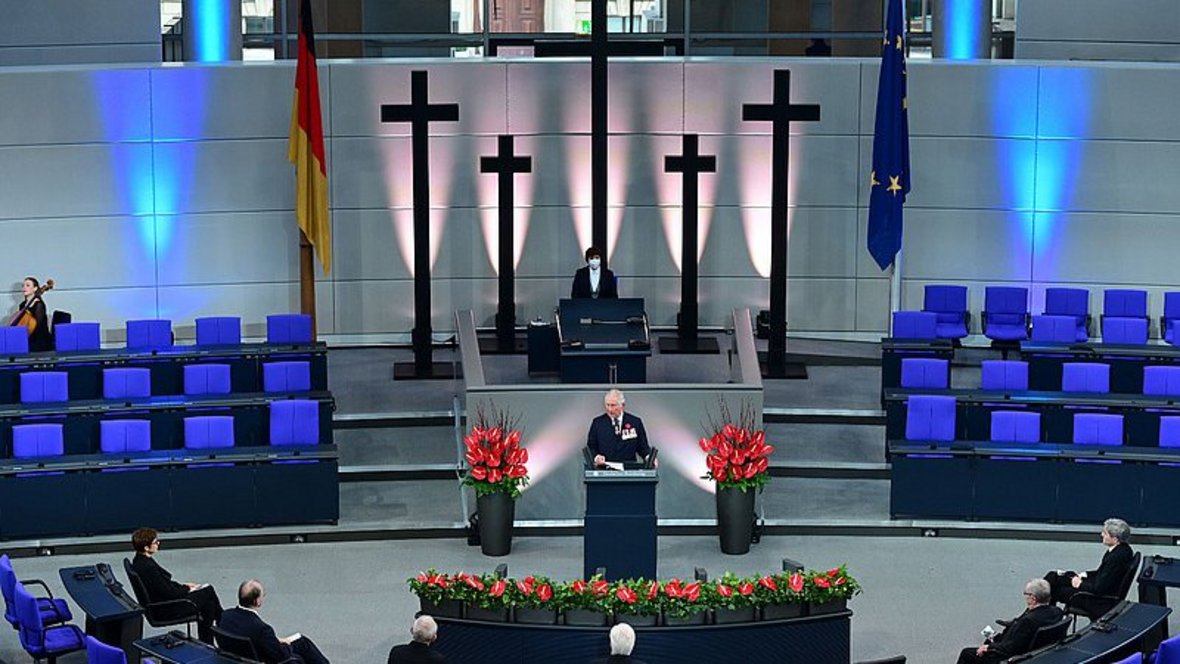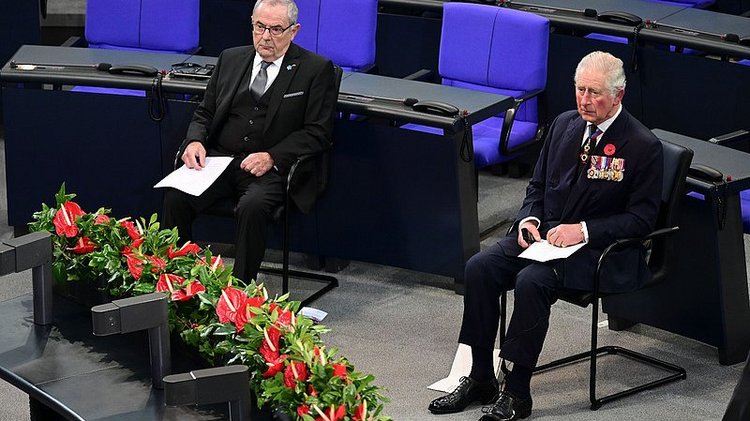
National Day of Mourning: Prince Charles speaks at the Volksbund’s main commemorative event in the Bundestag
They came as victors, but stayed on as friends
“Together, we are an indispensable force for good in our world”, declared His Royal Highness the Prince of Wales in the Bundestag (German Parliament) on Germany’s National Day of Mourning. That he had travelled to Berlin in spite of the dangers posed by the pandemic underlines the depth of the relations between Germany and Great Britain and the value of a shared future in peace.
„“Together, we are an indispensable force for good in our world”“
In his welcome address, President of the Volksbund Wolfgang Schneiderhan summed up the role of the British as follows: “They came as victors, but stayed on as friends.” Prince Charles was the first member of the British royal family to be invited to Germany’s national commemorative event held traditionally by the Volksbund Deutsche Kriegsgräberfürsorge (German War Graves Commission) in the plenary chamber of the German Parliament. The host was Wolfgang Schäuble, President of the German Parliament, and the invitation had been issued by German President Frank-Walter Steinmeier.
The prince said it filled him with great pride that he and Her Royal Highness the Duchess of Cornwall had been invited to renew these strong ties in this memorable year – 75 years after the end of the Second World War and following 75 years of peace and friendship.
Alternating between German and English
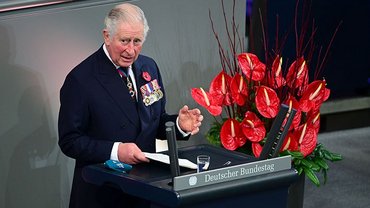 Foto: Uwe Zucchi
Foto: Uwe Zucchi
In his speech, during which he alternated between German and English, Prince Charles outlined a shared history, describing an arc from the Roman Empire to the present day, and spoke of exchange and the cross-fertilization of the two nations in the field of art and culture in order to demonstrate that following the cruel distortions up to 1945, Germany and Great Britain had drawn from the “deep and historic well of shared experience”, enabling the seeds of reconciliation to take root and flourish.
Reconciliation is a difficult but essential process and no one should believe that it is someone else’s burden to bear. “That we have healed so much division on our continent is cause for sustained gratitude and the utmost pride”, said the Prince of Wales. And yet nothing should be taken for granted. He also emphasised, however, that: “Today our nations stand together as inalienable partners in almost every imaginable area.”
With regard to the manifest threats to the planet, such as climate change and catastrophic biodiversity loss, the speaker appealed to both nations to act in concert. “So integrated is each nation in the future of the other that our national interests – even if they differ – will always be interwoven with each other.”
After Brexit: strengthening the ties in a new chapter
Prince Charles also made reference to Brexit and spoke of common interests: “Let us, at the beginning of the new chapter in our long history, strengthen these ties for the years ahead. Let us look back at everything we have overcome and everything we have learnt. Let us remember all the victims of war, tyranny and persecution: those who gave their lives in the cause of the freedoms we value today and those who are still, in the present, fighting for these freedoms. They inspire us to fight for a better future. Let us make this our mutual concern.” And finally: “We will always be friends, partners and allies.”
Four young Volksbund voices with personal messages
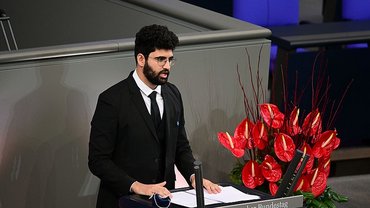 Foto: Uwe Zucchi
Foto: Uwe Zucchi
Four young people had already spoken on issues affecting Europe and beyond. Three of them were already associated with the Volksbund via its new PEACE LINE concept. The youngest, 17-year-old Jasleen Singh from Great Britain, came to the Volksbund’s attention via the German-British “Never Such Innocence” competition. Their highly personal peace messages were a valuable enrichment and expression of the Volksbund’s commitment to youth work.
„“We must honour those who died in World War Two by using our time in the best possible way, learning from history, so that future generations will not only remember them but live the change you and I can make.”“
Jasleen Singh
„“I grew up in a free Germany and in a Europe without borders. This privilege brings with it a responsibility to remember both those who died and the bereaved, to learn from history and to courageously oppose those who threaten this freedom with nationalism and xenophobia.”“
Martha Friese
„The main lesson of our history is to be appreciative of one another and to be thankful and curious towards diversity.”“
Dvir Aviam Ezra
„“Our task is to include the future generations in a historic peace dialogue and to bring up responsible, committed citizens. We should never forget the bloody wars and their consequences – and we should never stir up hate against other people. Our lives should not be determined by cynicism, self-interest and cowardice. The world of tomorrow cannot exist without ethics, faith and memory.”“
Violeta Avram
“We owe the British a great deal – and are grateful to them”
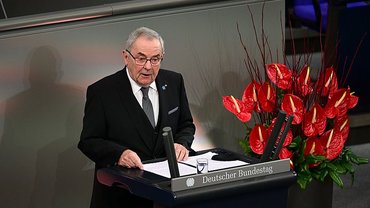 Foto: Uwe Zucchi
Foto: Uwe Zucchi
President of the Volksbund Wolfgang Schneiderhan referred in his speech to Winston Churchill, the former British prime minister, who in 1946, just a short while after the war, urged that the hand of friendship be extended to Germany when he declared that there could be no revival of Europe without a spiritually great Germany.
Schneiderhan stressed that: “We owe the British a great deal – and are grateful to them. I am delighted that we are able to say this to His Royal Highness the Prince of Wales today in person. His presence here is a great honour and a sign of the close bonds between Germany and Britain that run through all areas of society.
With regard to the Corona pandemic, the president also recalled those who “rebuilt the ruined country, who are now particularly vulnerable.” And he spoke of hatred and xenophobia, observing that national arrogance and contempt for others, anti-Semitism and racism fan flames that can grow into a world conflagration. “We must do everything we can to ensure that these flames are not allowed to spread in the first place but are extinguished as soon as they flare up. Peace education does not begin after a war has started but much earlier, with the prevention of any emergence of war-like stirrings.”
Anti-Semitism and racism in Germany: the Totengedenken expanded
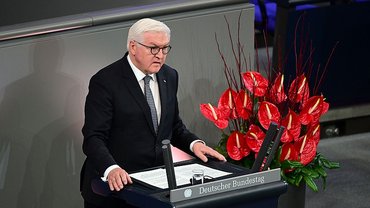 Foto: Uwe Zucchi
Foto: Uwe Zucchi
The President of Germany Frank-Walter Steinmeier had been moved in part by anti-Semitism and racism in Germany to expand the Totengedenken (tribute to the dead) that is traditionally recited on this day. “We also remember today the victims of hatred and violence here. We remember the victims of terrorism and extremism, anti-Semitism and racism in our country,” he declared. Henceforth this version of the Totengedenken is of universal relevance, wherever it is spoken.
Other traditional elements in the ceremony included last farewells played by solo trumpeters of the German and British armed forces – Britain’s Last Post and Germany's Totensignal based on the song “Der gute Kamerad”. The two national anthems rang out after the European anthem.
Film portrait of the Volksbund
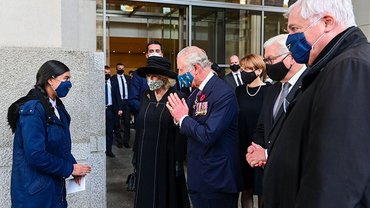
The Volksbund introduced its work in a three-and-a-half-minute film. And videos were also shown of musical contributions by Kathleen Ziegner, Christoph Scheibling and Tim Schmitz of the Bundeswehr (Federal German Army) Music Corps recorded in Berlin Cathedral. Live music, meanwhile, was provided by string ensemble the Furiant Quartett from Berlin.
Due to the current pandemic regulations, the number of guests in the Bundestag was drastically reduced. After leaving the plenary chamber, the prince and the federal president engaged in conversation with the four young people and learned more about the Volksbund’s new PEACE LINE concept.
ZDF broadcast the event live from the Bundestag. The recording can be found in the ZDF Mediathek.
Prince Charles’s speech (bilingual and German versions), Wolfgang Schneiderhan’s welcome address (in German and English) and the statements by the four young people are available in the Mediathek.
The “Forget-me-not” campaign
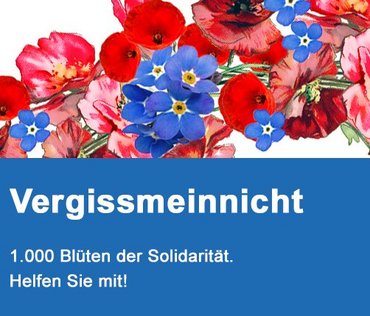
The Volksbund devised a special symbol to accompany the German-British commemoration on this National Day of Mourning, one which centred on forget-me-nots and poppies. These blue and red flowers adorn a wreath that is to be installed in Berlin’s Gedächtniskirche (Kaiser Wilhelm Memorial Church). Forget-me-nots and poppies are the symbolic flowers in Germany and the Commonwealth States respectively for all those who have died in war.
You can support the “Forget-me-not campaign” and the work of the Volksbund by making a donation – by bank transfer, direct debit or telephone. As a not-for-profit organization, the Volksbund finances its work mainly from membership subscriptions and donations. For more information, please visit www.volksbund.de/helfen.
